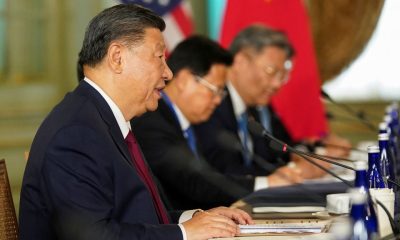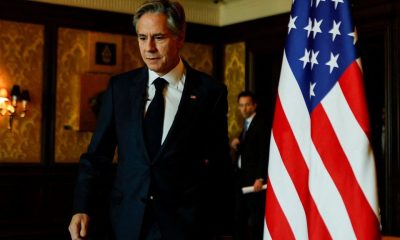AFRICA
Trump’s Zero-Tolerance Immigration Policy Draws Bipartisan Backlash
This past Father’s Day, Democratic and Republican politicians alike spoke out against what many are calling “Anti-Family” and “Anti-American” immigration policies. Bipartisan efforts to end the separation of families at the border have grown. With many new conservative voices speaking out, tensions rise between the administration’s orders and our country’s values.
The intended displacement of children from their mothers and fathers has been compared to Japanese Internment Camps and Nazi Concentration Camps multiple times. Former First Lady Laura Bush recently criticized the zero tolerance policy in an opinion piece for the Washington Post:
“I live in a border state. I appreciate the need to enforce and protect our international boundaries, but this zero-tolerance policy is cruel. It is immoral. And it breaks my heart. Our government should not be in the business of warehousing children in converted box stores or making plans to place them in tent cities in the desert outside of El Paso. These images are eerily reminiscent of the Japanese American internment camps of World War II, now considered to have been one of the most shameful episodes in U.S. history.”
Michael V Hayden, the former CIA Director under the Bush administration and current political Analyst for CNN, tweeted a picture of Nazi Concentration Camps in regards to the fairly new immigration practices. He captioned the picture “Other governments have separated mothers and children”
Other governments have separated mothers and children pic.twitter.com/tvlBkGjT0h
— Gen Michael Hayden (@GenMhayden) June 16, 2018
Local Government officials of Border States have expressed their opposition to the estrangement of immigrant families as well. Dallas County Judge Clay Jenkins tweeted his empathy and desire for change:
Happy #FathersDay to all! Breakfast in bed, cards and even a shirt. BBQing for family. The only thing that would make today better is for @HHSGov @DHSgov to accept our offer to provide housing and compassionate care for unaccompanied and separated children in @DallasCountyTx 🇺🇸 pic.twitter.com/WF9H7Cqb3P
— Clay Lewis Jenkins (@JudgeClayJ) June 17, 2018
Local officials from Tucson, Arizona pleaded for “not one more day” of the cruel policy. The superintendent of Pima County Schools, Dustin Williams, as well as Yaqui Tribe Chairman Robert Valencia, stated “The number one factor for destroying a child’s life is separating them from their mother, their father or their family.”
The Mayors of Los Angeles Ca, Houston TX, Albuquerque NM, and Tucson AZ, wrote a letter to Attorney General Jeff Sessions, condemning his call for “Zero-Tolerance” at the border:
“There is no clear or compelling justification – in our past or in our laws – for taking an average of 47 kids per day away from their mothers and fathers. Such a policy is cruel. It is morally reprehensible. It is not an appropriate use of taxpayer resources, and it is utterly inconsistent with our values of decency and compassion – with our basic humanity.”
The immigration policies have been met with backlash from the religious community as well. Multiple leaders of faith have denounced the harmful practices.
Christian Evangelist and Missionary Franklin Graham called the policy “disgraceful.” In a joint statement from the U.S. Episcopal Church, Presbyterian Church (USA), United Methodist Church, Evangelical Lutheran Church in America, Islamic Society of North America and Union for Reform Judaism, the Religious institutions plead for the families facing destruction:
“We affirm the family as a foundational societal structure to support human community and understand the household as an estate blessed by God. The security of the family provides critical mental, physical and emotional support to the development and well-being of children. We pray for the children and families that will suffer due to this policy and urge the Administration to stop their policy of separating families,”
On political, moral, religious, and bureaucratic levels, the Zero-Tolerance practice has been denounced. Representatives of the Trump administration continue to express the need for law enforcement and border security.
Featured Image via: Flickr/Gage Skidmore
AFRICA
The UK paid Rwanda an additional $126 million for the contested migrant plan.
As the tab for Britain’s controversial proposal to relocate asylum seekers to the East African nation continues to increase, the United Kingdom paid Rwanda an extra 100 million pounds ($126 million) in April. This was in addition to the 140 million pounds it had already provided Rwanda.
Even though the Rwanda project is at the core of the policy that British Prime Minister Rishi Sunak is employing to discourage illegal immigration, there have been no individuals sent to Rwanda as of yet due to legal challenges that have taken place since the initiative was introduced in 2022.
After Sunak’s immigration minister resigned this week, the polarizing policy is now regarded as a danger to Sunak’s leadership, which is anticipated to be challenged in the election that will take place the following year.
According to a letter that the British Ministry of the Interior issued on Thursday, the United Kingdom plans to give Rwanda fifty million pounds in addition to the 240 million pounds it has already provided to the East African nation.
The opposition Labour Party criticized the disclosures regarding the rising cost of a scheme that legal experts warned could collapse. Some parliamentarians within Sunak’s party are also expected to express their disapproval of the idea.
A statement by Yvette Cooper, the shadow interior minister for the Labour Party, on social networking site X, said, “Britain cannot afford more of this costly Tory chaos and farce.”
On Friday, however, the newly appointed minister for legal migration, Tom Pursglove, explained what he called the “investment” of 240 million pounds. He stated that once the Rwanda policy was operational, it would reduce the money spent on hosting asylum-seekers in the United Kingdom.
“When you consider that we are unacceptably spending 8 million pounds a day in the asylum system at the moment, it is a key part of our strategy to bring those costs down,” Pursglove explained to Sky News.
Pursglove stated that the money donated to Rwanda would assist in the country’s economic growth and help get the asylum relationship with the United Kingdom up and running.
There was no connection between the money sent to Rwanda and the treaty that the two nations signed on Tuesday, according to the letter from the Ministry of the Interior.
The treaty aims to respond to a ruling by the Supreme Court of the United Kingdom, which stated that the deportation plan would contravene local laws based on international human rights standards.
“The Government of Rwanda did not ask for any payment in order for a Treaty to be signed, nor was any offered,” according to the correspondence.
After Robert Jenrick resigned from his position as immigration minister on Wednesday, Sunak made a plea to fellow Conservative parliamentarians on Thursday to come together in support of his Rwanda proposal. He stated that the emergency legislation the government had drafted to get the scheme up and running did not go far enough.
Africa
UK interior minister travels to Rwanda to resurrect asylum plan.
On Tuesday, the Minister of the Interior of the United Kingdom, James Cleverly, came to Rwanda to sign a new treaty. This was done to circumvent a court judgment that blocked the government’s contentious policy of transferring asylum seekers to the East African nation.
The Rwandan plan is at the core of the government’s attempt to reduce migration, and it is being closely monitored by other nations who are considered to be considering policies that are comparable to Rwanda’s.
In a decision handed down a month ago, the Supreme Court of the United Kingdom stated that such a move would violate international human rights norms embedded in domestic legislation.
Following the decision, the United Kingdom has been making efforts to revise its agreement with Rwanda to incorporate a legally binding treaty that guarantees Rwanda would not remove asylum seekers brought there by the United Kingdom. This is one of the primary concerns of the court.
Several attorneys and charitable organizations have said that it is highly improbable that deportation flights will begin before the election. With a lead of more than ten percentage points in the polls, the opposition Labour Party intends to abandon the Rwanda policy if it is victorious.
A meeting between Cleverly, who arrived in Kigali, the capital of Rwanda, on Tuesday morning, and Vincent Biruta, the country’s Minister of Foreign Affairs, is scheduled to take place to sign the agreement.
“Rwanda cares deeply about the rights of refugees, and I look forward to meeting with counterparts to sign this agreement and further discuss how we work together to tackle the global challenge of illegal migration,” Cleverly says.
The United Kingdom aims to transfer thousands of asylum seekers who came to its beaches without authorization to Rwanda under the plan that was agreed upon the previous year. This discourages migrants from crossing the Channel from Europe in tiny boats.
In exchange, Rwanda has been given an initial payment of 140 million pounds, equivalent to 180 million dollars, along with the promise of additional funds to cover the costs of housing and medical treatment for any deported persons.
THE PRESSURE
A great deal of pressure is being put on Prime Minister Rishi Sunak to reduce net migration, which reached a record high of 745 thousand people in the previous year, with the vast majority of migrants entering through legal channels.
“Stop the boats” is one of the five goals that Sunak has set for his government. The influx of asylum seekers who pay people smugglers for their crossings of the Channel, which frequently take place in boats that are overloaded and not seaworthy, is one of the aims that Sunak has set.
The Supreme Court determined that the Rwanda plan should not be implemented because there was a possibility that refugees who were deported would have their claims incorrectly evaluated or that they would be sent back to their country of origin to suffer persecution.
In the latter part of this week, it is anticipated that the new treaty will be followed by the release of legislation declaring Rwanda a so-called safe nation. This law is intended to prevent legal challenges against the planned deportation flights.
Despite this, this will probably result in a fresh set of political and legal difficulties.
An immigration attorney at Harbottle & Lewis named Sarah Gogan stated that the government’s policy will be challenged due to Rwanda’s history of violations of human rights provisions.
“Rwanda is an unsafe country and this is not a quick fix,” added the politician. “You cannot in a matter of weeks or months reform a country and turn it into one with an impartial judiciary and administrative culture.”
Another “gimmick” was what Yvette Cooper, the spokesperson for the Labour Party’s home affairs department, called the most recent measures proposed by the administration.
Whether or not to design the law in a way that would avoid subsequent legal challenges is still up for debate by the administration.
Several members of the Conservative Party in parliament are putting pressure on the government to incorporate a “notwithstanding” clause into Rwanda’s policy. This clause would disapprove the domestic and international human rights commitments of the United Kingdom regarding Rwanda.
However, some politicians within the ruling party, such as Robert Buckland, have stated that such a move would be “foolish” and undermine the Good Friday Agreement, which is primarily responsible for ending three decades of carnage in Northern Ireland. This is because the European Convention on Human Rights supports the treaty.
AFRICA
Madagascar leader wins presidential vote, constitutional court says
On Friday, the High Constitutional Court of Madagascar certified Andry Rajoelina, the current President of Madagascar, to be the victor of the election a month ago, essentially granting him a third term in office.
Following the dismissal of several challenges submitted against the preliminary results by the electoral board, the court said that Rajoelina collected 58.96% of the votes that were cast.
Florent Rakotoarisoa, the chairman of the High constitutional court, stated that “Andry Rajoelina is elected as the president of the republic of Madagascar and is taking his functions as soon as the swearing (is conducted) comes to an end.”
The rejected challenge was submitted by the politician Siteny Randrianasoloniaiko, who received 14.39% of the vote, according to the court. This was one of the challenges that was denied.
Ten of the thirteen candidates chose not to participate in the election; nevertheless, their names were already on the ballot, so they could still divide the remaining votes. The court reported that the turnout was 46.35 percent.
The election on November 16 was preceded by weeks of demonstrations, during which the opposition accused Rajoelina of having fostered conditions that were unjust to the election.
The charges that the vote was rigged have been refuted by Rajoelina, and the army has issued a warning against any attempts to destabilize the country.
As far as the opposition is concerned, the voter turnout for the election was the lowest it has ever been in the country’s history.
Hajo Andrianainarivelo, a former minister who was one of the candidates who chose to abstain from voting, has committed to fight against what he has described as a lack of respect for the rules of the state and the tyranny of the people.
“The popular fight begins now,” he declared on Thursday referring to the ongoing conflict.
Rajoelina, now 49 years old, initially won power in a coup in 2009. After resigning from his position as the head of a transitional authority in 2014, he went on to win another election in 2018 and regain his position as president.
-

 Europe7 months ago
Europe7 months agoRussia’s Shoigu accuses the West of seeking to expand the Ukraine war to the Asia-Pacific.
-

 Geopolitics & Foreign Policy6 months ago
Geopolitics & Foreign Policy6 months agoTurkey’s Erdogan says he may visit Egypt soon, discuss Gaza patients -media.
-

 America8 months ago
America8 months agoRepublican US House to hold first Biden impeachment inquiry hearing
-

 Geopolitics & Foreign Policy6 months ago
Geopolitics & Foreign Policy6 months agoRussia deploys new nuclear missile in Kaluga region – RIA
-

 Geopolitics & Foreign Policy6 months ago
Geopolitics & Foreign Policy6 months agoCeasefire takes hold in Gaza ahead of hostage release; aid enters enclave.
-

 Gender, Sexuality & Identity8 months ago
Gender, Sexuality & Identity8 months agoGreenland women ask Denmark for compensation over involuntary birth control.
-

 Global Issues & Cooperation8 months ago
Global Issues & Cooperation8 months agoHuman rights in Russia have ‘significantly deteriorated’ – UN expert.
-

 ECONOMY5 months ago
ECONOMY5 months agoFinland will sign a defense pact with the US.
















